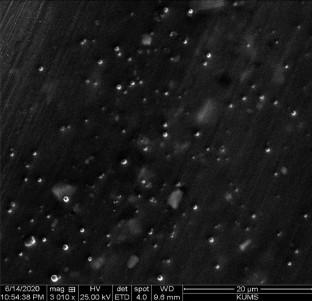Drug Delivery and Translational Research ( IF 5.4 ) Pub Date : 2022-09-04 , DOI: 10.1007/s13346-022-01215-5 Fereshteh Abdi 1 , Elham Arkan 2 , Mojtaba Eidizadeh 3 , Elahe Valipour 4 , Tahereh Naseriyeh 2 , Younes Hossainy Gamizgy 3 , Kamran Mansouri 3

|
Cutaneous malignant melanoma is fastest-growing cancer in white populations with a large majority of dermal cancer death. The activity of vascular endothelial growth factors (VEGFs) results in the signaling of a variety of downstream intracellular pathways that ultimately leads to cell activation, proliferation, migration, and angiogenesis. VEGF inhibitors such as bevacizumab are widely used in chemotherapy with systemic administration, which in many cases is associated with a variety of side effects. Here, we designed and synthesized a lipid-polymer nanoparticle for local administration of bevacizumab. Drug release, dermal absorption, and the effects of synthesized nanoparticles containing bevacizumab on cell proliferation and in vitro and in vivo angiogenesis were investigated. Encapsulating bevacizumab in the synthesized nanoparticles resulted in a significant increase in its dermal absorption compared to free bevacizumab. Also, the suppressor effects of bevacizumab encapsulated in the synthesized nanoparticle on cell proliferation and angiogenesis were significantly more than those of free bevacizumab. Our findings indicate the remarkable effects of lipid-polymer nanoparticles in dermal absorption and in maintaining bevacizumab bioactivity, suggesting therapeutic benefits of local bevacizumab administration for angiogenesis-related disorders such as cutaneous melanoma.
Graphical abstract
Chitosan nanoparticles containing bevacizumab antibody were synthesized by ion exchange method, and finally, these nanoparticles were coated with lipid (Lip-Chi-Bev NPs). In this study, the effect of synthesized nanoparticles on dermal absorption of bevacizumab was evaluated and its potential in inhibiting angiogenesis was evaluated by in vitro and in vivo models.
中文翻译:

载有贝伐单抗的脂质壳聚糖纳米颗粒抑制皮肤黑色素瘤血管生成的可能性
皮肤恶性黑色素瘤是白种人中增长最快的癌症,其中绝大多数为皮肤癌死亡。血管内皮生长因子 (VEGF) 的活性导致各种下游细胞内通路的信号传导,最终导致细胞活化、增殖、迁移和血管生成。贝伐珠单抗等 VEGF 抑制剂广泛用于全身给药的化疗,在许多情况下与多种副作用相关。在这里,我们设计并合成了一种用于贝伐珠单抗局部给药的脂质聚合物纳米颗粒。研究了药物释放、皮肤吸收以及含有贝伐珠单抗的合成纳米颗粒对细胞增殖以及体外和体内血管生成的影响。与游离的贝伐单抗相比,将贝伐单抗包裹在合成的纳米颗粒中导致其皮肤吸收显着增加。此外,封装在合成纳米颗粒中的贝伐单抗对细胞增殖和血管生成的抑制作用明显高于游离贝伐单抗。我们的研究结果表明脂质聚合物纳米粒子在皮肤吸收和维持贝伐单抗生物活性方面具有显着效果,表明局部贝伐单抗给药对血管生成相关疾病(如皮肤黑色素瘤)的治疗益处。封装在合成纳米颗粒中的贝伐珠单抗对细胞增殖和血管生成的抑制作用明显高于游离贝伐珠单抗。我们的研究结果表明脂质聚合物纳米粒子在皮肤吸收和维持贝伐单抗生物活性方面具有显着效果,表明局部贝伐单抗给药对血管生成相关疾病(如皮肤黑色素瘤)的治疗益处。封装在合成纳米颗粒中的贝伐珠单抗对细胞增殖和血管生成的抑制作用明显高于游离贝伐珠单抗。我们的研究结果表明脂质聚合物纳米粒子在皮肤吸收和维持贝伐单抗生物活性方面具有显着效果,表明局部贝伐单抗给药对血管生成相关疾病(如皮肤黑色素瘤)的治疗益处。
图形概要
含有贝伐单抗抗体的壳聚糖纳米颗粒通过离子交换法合成,最后,这些纳米颗粒被脂质包被(Lip-Chi-Bev NPs)。在这项研究中,评估了合成纳米颗粒对贝伐珠单抗皮肤吸收的影响,并通过体外和体内模型评估了其抑制血管生成的潜力。


























 京公网安备 11010802027423号
京公网安备 11010802027423号